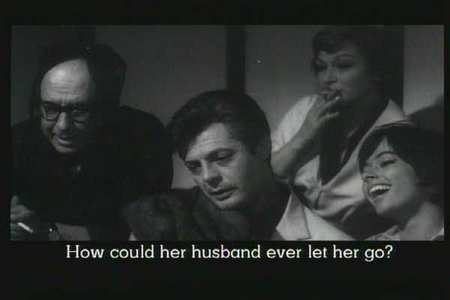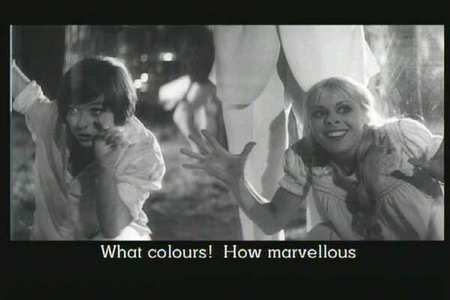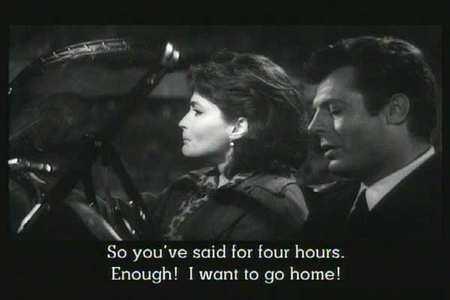Review of La Dolce Vita
Introduction
"The party must not end" - La Dolce Vita
Finally putting neo-realism to bed and indulging shamelessly in a more baroque cinematic style, Italian director Federico Fellini released `La Dolce Vita` (The Sweet Life) on an unsuspecting public in 1960. The film, a portrait of the ailing spiritual vacuity of Roman society during the post-war economic boom was an international sensation that p***ed off the Vatican something awful (the Pope demanded that followers boycott the film, attempts were made to have it banned), not to mention found friends in the Marxist left from whom Fellini had formerly alluded praise, thanks largely to his allegedly sentimental Catholic back catalogue. Unsurprisingly, both sides caught the wrong end of the stick, as fundamentalist zealots are, in their haste, prone to do.

Video
Tons of flaring, dirt, sun-spots and God Knows What else, this presentation of `La Dolce Vita` is a little below-par. A non-anamorphic transfer that is a few grades better than video, but not nearly up to the capabilities of the technology to vastly improve the quality of older films. Remastered? My arse!

Audio
Makes the video look like reference quality by comparison. Crap, crackly mono track which is covered in sonic dust and enough volume changes to warrant a prompt pressing of the mute button. Just be thankful there`s subtitles. Suffice to say Nino Rota`s landmark score is not well served.

Features
Um, fewer films have been more enthusiastically debated in the history of cinema, its exhaustive production, its stylistic inventiveness, its unprecedented success and its moral weight are the sorts of things retrospective documentaries and commentaries were designed for… why then do we only get some production notes, a synopsis and a Fellini filmography? So weak it hurts.

Conclusion
Marcello (Marcello Mastroianni), a hack writer for a Roman scandal sheet, is our guide into the faithless swamp of modern consumer Rome, which may be the home of the Catholic church, but that institution is as corrupt as any other, whose `miracles` are reduced to the common banality of the media circus generated by Marcello and his colleagues. Its a city populated by bumbling despots, stupid starlets, arrogant academics, ridiculous intellectuals, spoiled aristocrats and pretty much every variety of deluded elitist you can imagine.
`La Dolce Vita` was a turning point in Italian cinema, and, indeed, cinema in general. It dragged the solemn `realism` of the post-war years blinking into the dazzling glow of spectacle and stylistic decadence. No surprise then, that the ironic bite in `La Dolce Vita` is its vicious critique on a superficial society so bankrupt that it cannot even muster up the energy to cultivate some despair. As a condemnation of the ephemeral hedonism of the consumer society, its unmatched in its wit, its observation and its stylistic bravura.
Although in many ways a comedy (it certainly dumps the self-pitying tragedy Fellini exploited to triumphant effect in `La Strada` ) `La Dolce Vita` suggests a misanthropy that not only envelopes individuals of all social groups but also the very city itself. Fellini`s Rome is at once an archaic fairground of dizzying bombast, dream-like spectacle and ancient decadence while at the same time the bleak fascist tower-blocks which house the characters are empty, airless and suffocating. Although we may be moved by the joyless possessiveness of Marcello`s lover Emma (Yvonne Furneaux), the cold multiplicity of society dame Maddalena, the provincial honesty of Marcello`s father (Annibale Ninchi) or even the quashed ambition of our anti-hero, the film`s bleak pessimism seems to share in their own apathy for their fates. The salvation and possible redemption present in almost all films of its time has finally been vanquished, and the characters embrace the oblivion of their insatiable appetites for pleasure, while at the same time recognising that instant gratification offers no kind of satisfaction to life`s mysteries.
So it`s a masterpiece, but you might not know it given this substandard release, which is, quite frankly, stunningly mediocre. Such a great film deserves so much better, in fact, buy the video out of sheer consternation.
Your Opinions and Comments
Be the first to post a comment!